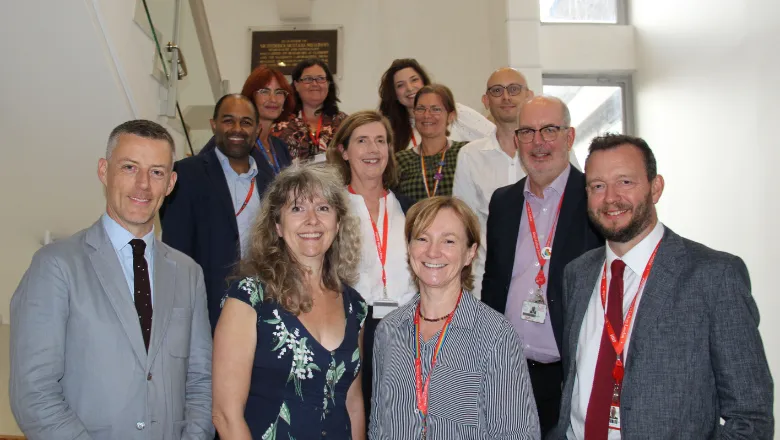
Professor Fiona Gaughran
Professor of Physical Health and Clinical Therapeutics
- Lead Consultant Psychiatrist, National Psychosis Service and Director of Research and Development, South London and Maudsley NHS Foundation Trust
Research interests
- Psychiatry
Contact details
Biography
Professor Fiona Gaughran has had a visiting attachment to IoPPN since 2000 and took up a substantive role in 2014. She is a Professor of Physical Health and Clinical Therapeutics in Psychiatry at the Institute of Psychiatry, Psychology & Neuroscience. She is also Director of Research and Development at the South London and Maudsley NHS Foundation Trust in London, where she is the Lead Consultant for the National Psychosis Service. She also chairs the Board of the NIHR Maudsley Biomedical Research Centre.
Professor Gaughran qualified in Medicine from University College, Dublin, later receiving her Doctorate from University College, Cork. She first worked in medicine in St Vincent’s Hospital, Dublin, achieving membership of the Royal College of Physicians in Ireland, and went on to complete general and specialist psychiatry training in the Irish Southern Health Board and National schemes respectively. She is a Fellow of the Royal College of Psychiatrists as well as of the Royal Colleges of Physicians in Edinburgh and Dublin.
As part of her clinical role, Professor Gaughran is responsible for implementing new, evidence-based approaches to help people with psychotic illnesses that have not responded well to treatment. She publishes widely on psychosis and on the physical health of people with major mental illnesses. Professor Gaughran has published over 200 papers, books and book chapters and recently co-edited the widely-acclaimed book, the “Maudsley Practice Guidelines for Physical Health Conditions in Psychiatry”. She also has an interest in improving the implementation and application of digital technology and was the Theme Lead for Applied Informatics in the NIHR Applied Research Collaboration in South London from 2019-2024.
From 2020-2024, Professor Gaughran was named as a Clarivate Web of Science Highly-cited Researcher. This is an accolade awarded to the 1 in 1,000 scientists “who have demonstrated significant and broad influence”, reflected by the publication of multiple papers among the top 1% most cited in their field over the last decade.
In 2024 Professor Gaughran was awarded a 2024 President’s Medal by the Royal College of Psychiatrists for exceptional contributions to psychiatry.
PURE profile: https://kclpure.kcl.ac.uk/portal/en/persons/fiona.p.gaughran
Grants awarded through South London and Maudsley Foundation Trust:
2024 Gaughran F. South London and Maudsley NIHR Capital Funds 2024-2027 £1,300,532
2022 Ourselin S et al, Digital Health Hub, Engineering and Physical Sciences Research Council. 2023-26 (Co-applicant) £2,639,083
2022 Cotter D et al. Investigating the relationship between Complement Pathway and outcomes in Psychosis; 2022-26 (Co-I) Health Research Board, Ireland. 2022-26 (Co-I) €369,866
Named collaborator
- VISTA (Vision To Action for recovery in mental health). Cotter D et al. Health Research Board APRO 2023
- Achieving recovery in psychotic disorders with comprehensive clinical guidelines. O’Donoghue B et al, Health Research Board APRO 2023
News
New funding for UK mental health research in under-served areas
The NIHR is investing almost £55 million in five additional Mental Health Research Groups (MHRGs). King’s College London researchers will collaborate on three...

Doctors call for improved physical health monitoring for people prescribed psychiatric medication
A major new Lancet Commission has called for people taking psychiatric medications — such as antidepressants, antipsychotics, and mood stabilisers - to...

£1.3M awarded to South London and Maudsley NHS Foundation Trust for cutting-edge research equipment and technology
The National Institute for Health and Care Research (NIHR) has awarded £1.3 million to South London and Maudsley NHS Foundation Trust to pay for new research...

King's staff recognised at Royal College of Psychiatrists awards 2024
The Royal College of Psychiatrists Awards 2024 were announced at the ceremony on 7 November 2024

Immersive technology for mental health receives £20m investment and UKRI Innovator Support Programme
King's is a partner in a new supportive ecosystem for UK innovators working on immersive digital mental health therapeutics is being launched.

A new generation of Inspiring Women at the IoPPN
28 new portraits of internationally recognised female professors at the Faculty have been added to IoPPN’s ‘Inspiring Women’ exhibition, celebrating the...

New tool to streamline prescribing of antidepressants
A new web tool has been designed by researchers at King's College London and the University of Oxfordto simplify the prescription of antidepressant and...

Lord O'Shaughnessy visits King's College London and the NIHR King's Clinical Research Facility
Lord O’Shaughnessy, Former Health Minister and Senior Partner at consultancy firm Newmarket Strategy visited IoPPN and the NIHR King's Clinical Research...

Review finds significant barriers in shift to remote mental health services during pandemic
New findings from research exploring mental health care provided by phone and video call during the COVID-19 pandemic.

Review finds significant barriers in shift to remote mental health services during pandemic
Researchers are calling for further examination into the effects of telemental health on groups at risk of digital exclusion and for better evidence on...

Events

Research Showcase in Eating and Weight Disorders
Join us to celebrate the launch of the Centre for Research in Eating and Weight Disorders at King's College London, and discover research from the NIHR...
Please note: this event has passed.
News
New funding for UK mental health research in under-served areas
The NIHR is investing almost £55 million in five additional Mental Health Research Groups (MHRGs). King’s College London researchers will collaborate on three...

Doctors call for improved physical health monitoring for people prescribed psychiatric medication
A major new Lancet Commission has called for people taking psychiatric medications — such as antidepressants, antipsychotics, and mood stabilisers - to...

£1.3M awarded to South London and Maudsley NHS Foundation Trust for cutting-edge research equipment and technology
The National Institute for Health and Care Research (NIHR) has awarded £1.3 million to South London and Maudsley NHS Foundation Trust to pay for new research...

King's staff recognised at Royal College of Psychiatrists awards 2024
The Royal College of Psychiatrists Awards 2024 were announced at the ceremony on 7 November 2024

Immersive technology for mental health receives £20m investment and UKRI Innovator Support Programme
King's is a partner in a new supportive ecosystem for UK innovators working on immersive digital mental health therapeutics is being launched.

A new generation of Inspiring Women at the IoPPN
28 new portraits of internationally recognised female professors at the Faculty have been added to IoPPN’s ‘Inspiring Women’ exhibition, celebrating the...

New tool to streamline prescribing of antidepressants
A new web tool has been designed by researchers at King's College London and the University of Oxfordto simplify the prescription of antidepressant and...

Lord O'Shaughnessy visits King's College London and the NIHR King's Clinical Research Facility
Lord O’Shaughnessy, Former Health Minister and Senior Partner at consultancy firm Newmarket Strategy visited IoPPN and the NIHR King's Clinical Research...

Review finds significant barriers in shift to remote mental health services during pandemic
New findings from research exploring mental health care provided by phone and video call during the COVID-19 pandemic.

Review finds significant barriers in shift to remote mental health services during pandemic
Researchers are calling for further examination into the effects of telemental health on groups at risk of digital exclusion and for better evidence on...

Events

Research Showcase in Eating and Weight Disorders
Join us to celebrate the launch of the Centre for Research in Eating and Weight Disorders at King's College London, and discover research from the NIHR...
Please note: this event has passed.
